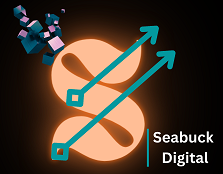I. Introduction
In today’s rapidly evolving digital landscape, businesses are constantly seeking innovative ways to stay ahead of the competition. One groundbreaking technology that has emerged as a game-changer is Generative AI. This article explores how Generative AI is revolutionizing digital marketing and SEO, transforming the way businesses create content, personalize user experiences, and automate their processes.

A. Definition of Generative AI
Generative AI refers to a subset of artificial intelligence that enables machines to generate original and creative content autonomously. It leverages deep learning algorithms and neural networks to mimic human-like thinking and decision-making, enabling machines to generate text, images, and even videos. Generative AI has found applications in various domains, including digital marketing and SEO, where its capabilities have proven to be highly advantageous.
B. Brief Explanation of Digital Marketing and SEO
Digital marketing encompasses all marketing efforts conducted through digital channels such as websites, search engines, social media, email, and more. It aims to promote products or services, build brand awareness, and engage with potential customers in the online realm. SEO, or search engine optimization, is a crucial component of digital marketing that focuses on improving a website’s visibility and organic rankings on search engine results pages (SERPs).
C. Thesis Statement: Generative AI is Revolutionizing Digital Marketing and SEO by Enhancing Content Creation, Personalization, and Automation
Generative AI has introduced a paradigm shift in the world of digital marketing and SEO, redefining how businesses attract, engage, and convert their target audience. By leveraging Generative AI, companies can optimize their content creation process, deliver highly personalized experiences, and automate time-consuming tasks. Let’s delve into these three transformative aspects of Generative AI in more detail.
Let’s look at a statistics on Generative AI Adoption Rates by Industry in the United States in 2023. In a survey conducted in 2022 among professionals in the United States, findings revealed that 37 percent of individuals employed in the advertising or marketing field utilized artificial intelligence (AI) to aid in their work-related tasks. On the other hand, the healthcare sector exhibited the lowest rate of AI adoption, with only 15 percent of respondents indicating its usage in their workplace.
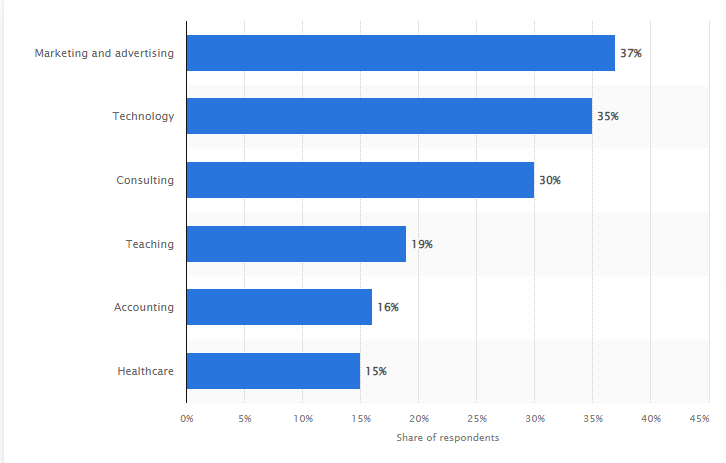
II. How Generative AI is Revolutionizing Content Creation
Content Creation
How Creators and Marketers Utilize AI: Based on a survey findings conducted by Hubspot, 33% of marketers employing AI utilize it as a tool for generating ideas or seeking inspiration for their marketing content.
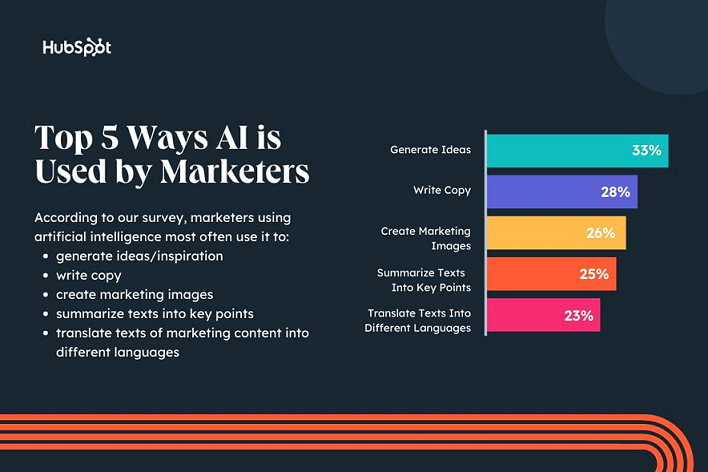
A. Traditional Content Creation Challenges
Traditional content creation often poses various challenges for marketers. Generating high-quality and engaging content consistently can be time-consuming and resource-intensive. Marketers often struggle with brainstorming ideas, developing unique angles, and maintaining consistency in messaging and brand voice.
B. Role of Generative AI in Content Creation
Generative AI has emerged as a game-changer in content creation, revolutionizing the way marketers approach the process. It leverages advanced technologies such as Natural Language Generation (NLG) algorithms and automated content creation tools to overcome traditional challenges.
1. Natural Language Generation (NLG) Algorithms
Generative AI utilizes NLG algorithms to generate human-like text autonomously. These algorithms analyze large datasets, identify language patterns, and produce coherent and contextually relevant content. By mimicking human creativity and linguistic skills, NLG algorithms enable marketers to streamline the content creation process.
2. Automated Content Creation Tools
Generative AI-powered automated content creation tools simplify and expedite the content generation process. These tools utilize NLG algorithms to generate content across various formats, including articles, blog posts, social media captions, and product descriptions. Marketers can input specific guidelines and parameters, allowing the AI to generate customized content at scale.
C. Benefits of Generative AI in Content Creation
1. Increased Efficiency and Productivity
Generative AI significantly enhances efficiency and productivity in content creation. By automating time-consuming tasks such as idea generation and initial content drafting, marketers can allocate their resources to more strategic activities. This increased efficiency enables businesses to produce a higher volume of quality content in less time.
2. Scalability and Consistency in Content Production
Generative AI facilitates scalability by automating content production. Marketers can leverage the AI-powered tools to generate content for multiple platforms simultaneously. Moreover, Generative AI ensures consistency in messaging and brand voice across various channels, resulting in a unified and cohesive brand identity.
3. Enhanced Creativity and Innovation
Generative AI algorithms can spark creativity and inspire innovative content ideas. By analyzing vast datasets and identifying patterns, the AI can suggest unique angles, perspectives, or content formats that human creators may not have considered. This collaboration between human creativity and AI-driven suggestions leads to fresh and captivating content that resonates with the target audience.
In conclusion, Generative AI has revolutionized content creation by addressing traditional challenges and introducing new possibilities. By leveraging NLG algorithms and automated content creation tools, businesses can enhance efficiency, scale their content production, ensure consistency, and foster creativity and innovation. As this technology continues to advance, the future of content creation holds exciting prospects for marketers seeking to engage their audience with compelling and personalized content.
III. The Power of Personalization in Digital Marketing
Personalization
As per a recent report by Twilio Segment, businesses across the globe are wholeheartedly embracing artificial intelligence (AI) to deliver tailored and personalized customer experiences.
We have already seen a study conducted in 2018 where the data highlights the primary motives behind utilizing artificial intelligence for marketing personalization, as reported by industry experts worldwide. The findings reveal that 57 percent of respondents recognized the advantageous impact of AI in enhancing their performance metrics. Conversely, a mere one percent of industry professionals surveyed expressed skepticism regarding the benefits of AI implementation for marketing personalization.
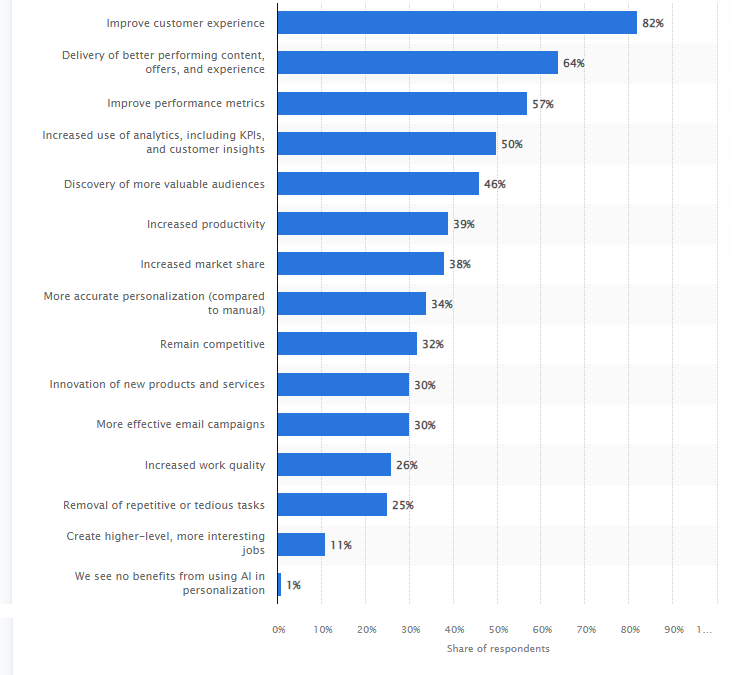
A. Importance of Personalization in Digital Marketing
In the fast-paced world of digital marketing, personalization has become a vital ingredient for success. Tailoring experiences, messaging, and recommendations based on individual preferences, demographics, and behaviors can make a significant impact on customer engagement and conversions.
B. Role of Generative AI in Personalization
Generative AI plays a pivotal role in achieving effective personalization in digital marketing. By leveraging machine learning algorithms and data analysis, Generative AI enables marketers to understand their audience better and deliver personalized experiences at scale.
For example, Coca-Cola has embraced the use of OpenAI’s ChatGPT and DALL-E systems to produce personalized ad copy and images on a large scale. (Source: cbinsights)
1. Machine Learning Algorithms for User Segmentation
Generative AI harnesses the power of machine learning algorithms to segment users into distinct groups based on their behavior, interests, and demographics. These algorithms analyze vast amounts of data, identifying patterns and creating accurate user profiles. Marketers can then tailor their campaigns and content to cater to the specific needs and preferences of each segment.
2. Customized Messaging and Product Recommendations
Generative AI empowers marketers to create customized messaging and product recommendations for each individual user. By analyzing user data and preferences, the AI can generate personalized content, emails, and recommendations that resonate with each user on a deeper level. This level of personalization enhances the user experience and increases the chances of conversion.
C. Benefits of Generative AI in Personalization
1. Improved Customer Engagement and Satisfaction
Personalization through Generative AI leads to improved customer engagement and satisfaction. By delivering tailored content, offers, and recommendations, businesses can create a more meaningful connection with their customers. Users feel understood and valued, resulting in higher engagement, longer website visits, and increased brand loyalty.
2. Higher Conversion Rates and Customer Retention
Generative AI-driven personalization has a direct impact on conversion rates and customer retention. By providing personalized recommendations and offers, businesses can increase the likelihood of conversion and repeat purchases. When users feel that their needs are understood and addressed, they are more likely to choose and remain loyal to a brand.
3. Enhanced Targeting and Audience Segmentation
Generative AI enhances targeting and audience segmentation capabilities. By leveraging machine learning algorithms, businesses can uncover hidden patterns and insights within their user data. This enables them to refine their targeting strategies, identify new audience segments, and create more precise and effective marketing campaigns.
In conclusion, personalization powered by Generative AI is a game-changer in digital marketing. By utilizing machine learning algorithms for user segmentation and delivering customized messaging and recommendations, businesses can drive higher customer engagement, improve conversion rates, and foster brand loyalty. The benefits of Generative AI in personalization extend beyond individual experiences, enabling businesses to enhance their targeting and segmentation strategies for greater success in the digital realm.
IV. Embracing Automation: Generative AI in Digital Marketing & SEO
Automation
A. Time-consuming Tasks in Digital Marketing and SEO
Digital marketing and SEO involve various time-consuming tasks that can hinder productivity and hinder the ability to focus on strategic initiatives. Some of these tasks include:
- Keyword research and analysis
- Content scheduling and distribution
- Data analysis and reporting
- Customer support and lead generation
B. Role of Generative AI in Automation
Generative AI offers innovative solutions to automate these time-consuming tasks, allowing marketers and SEO professionals to streamline their processes and allocate their time more efficiently. Let’s explore two key areas where generative AI plays a significant role in automation.
1. Chatbots and Virtual Assistants
Generative AI powers chatbots and virtual assistants, revolutionizing customer support and lead generation. These AI-driven assistants can handle routine customer inquiries, provide instant responses, and even engage in natural conversations. By automating customer interactions, businesses can provide 24/7 support, reduce response times, and enhance customer satisfaction.
A study shows that the chatbot market is projected to experience a robust growth with a compound annual growth rate of 23.3% from 2023 to 2030, ultimately reaching a market value of USD 27,297.2 million by 2030 on a global scale.
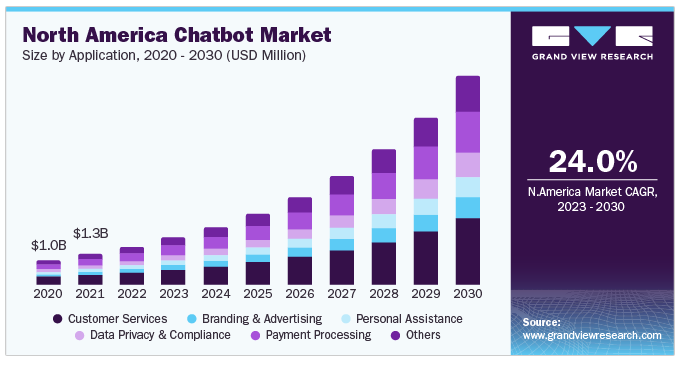
2. Automated Data Analysis and Reporting
Generative AI simplifies data analysis and reporting processes by automating data collection, analysis, and visualization. Machine learning algorithms can process vast amounts of data and extract valuable insights in real-time. Marketers can use these insights to optimize campaigns, track key performance indicators, and make data-driven decisions promptly.
C. Benefits of Generative AI in Automation
1. Increased Operational Efficiency and Cost-Effectiveness
Generative AI enables businesses to achieve greater operational efficiency and cost-effectiveness by automating time-consuming tasks. With automated processes, companies can save valuable time and resources, allowing teams to focus on strategic initiatives. Additionally, reduced manual effort minimizes the risk of errors, leading to cost savings in the long run.
2. Real-time Insights and Data-driven Decision-making
Through automated data analysis, generative AI provides businesses with real-time insights into their marketing and SEO performance. Marketers can access up-to-date information on campaign effectiveness, customer behavior, and market trends. This enables them to make data-driven decisions promptly, optimize strategies, and stay ahead of the competition.
3. Streamlined Customer Support and Lead Generation
Generative AI-powered chatbots and virtual assistants streamline customer support and lead generation processes. These AI-driven agents can handle multiple customer inquiries simultaneously, provide instant responses, and even qualify leads. By automating these processes, businesses can enhance customer satisfaction, improve response times, and generate more qualified leads.
In conclusion, generative AI’s role in automation has transformed digital marketing and SEO by simplifying time-consuming tasks. With the power of chatbots, virtual assistants, and automated data analysis, businesses can achieve increased operational efficiency, gain real-time insights, and deliver superior customer support. By embracing automation through generative AI, organizations can optimize their resources, make data-driven decisions, and create a seamless customer experience in the digital landscape.
V. Navigating Challenges and Ethical Considerations in Generative AI
A. Potential Biases and Ethical Concerns in Generative AI
Generative AI, while transformative, is not without its challenges and ethical considerations. It’s important to address these concerns to ensure responsible and unbiased use of the technology.
A study by British Medical Journal addresses the Disparity and Bias in the Development and Utilization of AI in Healthcare Applications. The image below shows the design and utilization of artificial intelligence (AI) systems that reflect the far-reaching consequences of health inequality and discrimination

1. Biases in Data and Algorithmic Outputs
Generative AI systems heavily rely on data inputs, and if the data used to train these systems is biased, it can lead to biased outputs. Biases can emerge from historical data, societal prejudices, or inadequate representation. Developers must be cautious in sourcing diverse and inclusive datasets and continuously monitor and mitigate biases that may emerge during the training process.
2. Impersonation and Misuse of AI-generated Content
Generative AI can produce content that mimics human-generated content so convincingly that it becomes challenging to differentiate between the two. This raises concerns about the potential misuse of AI-generated content for malicious purposes, such as spreading misinformation, generating fake reviews, or impersonating individuals. Stricter regulations and ethical guidelines need to be in place to combat such misuse effectively.
B. Balancing Automation with Human Touch
While automation through generative AI offers numerous benefits, it is crucial to strike a balance between automation and maintaining the human touch in digital marketing and SEO efforts.
1. Human Creativity and Authenticity
Generative AI can streamline content creation and automate processes, but it may lack the nuanced human creativity and authentic voice. Businesses should strive to infuse their content and messaging with a human touch that resonates with their target audience. Combining AI-generated recommendations with human creativity ensures that the content remains engaging, relatable, and authentic.
2. Human Oversight and Decision-making
While AI can provide valuable insights and automate certain tasks, human oversight remains essential. Human professionals should review and verify AI-generated content, analyze the data-driven insights, and make informed decisions based on a combination of AI recommendations and their expertise. This ensures that the final output aligns with business goals, ethical considerations, and the needs of the target audience.
C. Regulatory and Privacy Implications
The widespread use of generative AI in digital marketing and SEO raises regulatory and privacy concerns that need to be carefully addressed.
1. Compliance with Data Protection Regulations
Generative AI relies on vast amounts of user data for personalization and targeting. Businesses must comply with data protection regulations, such as the General Data Protection Regulation (GDPR) or the California Consumer Privacy Act (CCPA). This involves obtaining appropriate consent, ensuring data security, and providing transparent privacy policies.
2. Transparency and Explainability
AI-generated outputs should be transparent and explainable to users. People have the right to understand when they are interacting with AI systems and how their data is being used. Businesses should communicate clearly about the involvement of AI in their processes, provide explanations when AI-generated content is presented, and be transparent about data collection, usage, and retention practices.
In conclusion, while generative AI offers immense potential, addressing challenges and ethical considerations is essential. Mitigating biases, maintaining the human touch, and adhering to regulatory and privacy guidelines will contribute to responsible and effective use of generative AI in digital marketing and SEO. Striking the right balance between automation and human involvement ensures that the technology serves as a powerful tool while upholding ethical standards and delivering value to businesses and their customers.
VI. Exploring Google’s New Generative AI and its Impact on Google’s Search
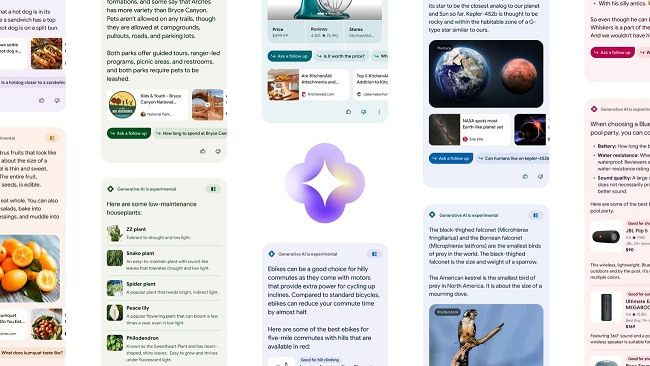
With the rapid advancements in generative AI, even tech giants like Google have hopped on the bandwagon and embraced the transformative potential of this cutting-edge technology. Google’s adoption of generative AI has profound implications not only for its search engine but also for the way users interact with search results. So, let’s dive into the key points that need to be covered in this captivating section:
1. Introduction to Google’s Generative AI
Google, known for its innovation and technological prowess, has ventured into the realm of generative AI. They have developed specialized AI models that are purpose-built for generating content. This move represents a strategic investment in harnessing the power of artificial intelligence to elevate their search ecosystem to new heights.
2. Improved Search Results Quality
One of the notable impacts of Google’s generative AI models is their ability to enhance the quality of search results. By employing these advanced AI models, Google can generate more relevant and accurate snippets, meta descriptions, and featured snippets. This leads to a richer and more informative search experience for users, empowering them to find precisely what they’re searching for in a fraction of the time.
3. Natural Language Processing (NLP) Advancements
Google has made significant strides in Natural Language Processing (NLP) through the use of generative AI. These advancements enable Google’s search engine to better understand search queries and interpret user intent with greater accuracy. By comprehending the nuances of language, Google can provide search results that align more closely with what users are truly seeking.
4. Enhanced User Experience
The integration of Google’s generative AI technology has a profound impact on user experience. By leveraging AI to generate search results, Google can present users with more concise and informative snippets, reducing the need for them to navigate through multiple links to find the desired information. This streamlined approach saves users time and effort, making their search journey a smoother and more satisfying one.
5. Voice Search Optimization
With the rising popularity of voice-based interactions, Google’s generative AI technology plays a crucial role in optimizing voice search results. By generating concise and contextually relevant responses to voice queries, Google enables more efficient and seamless voice-based interactions. Users can simply ask their questions, and Google’s AI-powered algorithms provide them with accurate and helpful responses, without the need for extensive manual searching.
6. Addressing Biases and Ethical Considerations
Google recognizes the potential biases that may arise in AI-generated search results. They are committed to addressing these biases through continuous monitoring, algorithm refinement, and adherence to ethical guidelines. Google strives to ensure that search results are fair, unbiased, and inclusive, promoting a more balanced and equitable online ecosystem.
7. Future Developments and Challenges
Looking ahead, Google envisions a multitude of future developments in generative AI. They are exploring ways to leverage AI models for content generation across various Google products, aiming to deliver more personalized and tailored experiences to users. However, challenges lie ahead, such as fine-tuning models to handle diverse languages and ensuring the ethical use of generative AI in search results. Google remains committed to overcoming these challenges and pushing the boundaries of what AI can achieve in the realm of search.
VII. Embracing the Future: Generative AI’s Impact on Digital Marketing and SEO
Future Implications and Conclusion
A. Potential Future Developments in Generative AI and Its Impact on Digital Marketing and SEO
The field of generative AI is continuously evolving, and its future holds immense potential for revolutionizing digital marketing and SEO. According to Gartner’s prediction, the contribution of generative AI to the total volume of data generated is expected to increase significantly. By 2025, it is estimated that generative AI will represent 10% of all data created, compared to only 1% in 2022
Here are some potential developments that can shape the landscape:
1. Advanced Natural Language Generation (NLG) Algorithms
Future advancements in generative AI will likely lead to even more sophisticated natural language generation algorithms. These algorithms will enable AI systems to generate content that closely resembles human-written text, improving the quality and authenticity of AI-generated content.
2. Enhanced Personalization and Hyper-targeting
Generative AI will further enhance personalization capabilities by leveraging advanced machine learning algorithms. AI systems will have a deeper understanding of user preferences and behaviors, allowing for hyper-targeted marketing campaigns and highly customized user experiences.
3. Voice-based Interactions and Voice Search Optimization
As voice-based interactions continue to gain popularity, generative AI will play a crucial role in voice search optimization and voice assistant interactions. AI systems will be able to understand natural language commands and generate responses that align with user intent, leading to more effective voice-based marketing strategies.
B. Summary of Key Points
Throughout this article, we have explored the transformative potential of generative AI in the realm of digital marketing and SEO. Here are the key points discussed:
- Generative AI enhances content creation by utilizing natural language generation algorithms and automated content creation tools, leading to increased efficiency, scalability, and enhanced creativity.
- In personalization, generative AI leverages machine learning algorithms to segment users and deliver customized messaging and product recommendations, resulting in improved customer engagement, higher conversion rates, and enhanced targeting.
- Automation through generative AI streamlines time-consuming tasks such as customer support and data analysis, leading to increased operational efficiency, real-time insights, and streamlined processes.
- However, challenges and ethical considerations exist, including biases in data and outputs, the need to balance automation with the human touch, and regulatory and privacy implications.
C. Concluding Thoughts on the Transformative Potential of Generative AI in Digital Marketing and SEO
Generative AI holds immense promise in transforming the landscape of digital marketing and SEO. As the technology continues to advance, businesses must embrace its potential while addressing the associated challenges and ethical considerations.
By harnessing the power of generative AI, businesses can unlock new opportunities for content creation, personalization, automation, and customer engagement. The future of generative AI in digital marketing and SEO will be characterized by increasingly sophisticated algorithms, hyper-targeted campaigns, and seamless voice-based interactions.
To fully leverage the transformative potential of generative AI, businesses must strike a balance between AI-driven automation and human involvement, ensuring authenticity, creativity, and ethical practices. Adhering to regulations and privacy guidelines while staying vigilant against biases and misuse will be crucial.
In conclusion, generative AI is poised to revolutionize digital marketing and SEO. By embracing the future developments and addressing ethical considerations, businesses can leverage generative AI as a powerful tool to drive success, enhance customer experiences, and stay ahead in the dynamic and ever-evolving digital landscape.
Read More:
A Definitive Guide to Digital Marketing in 2023 – SeabuckDigital
